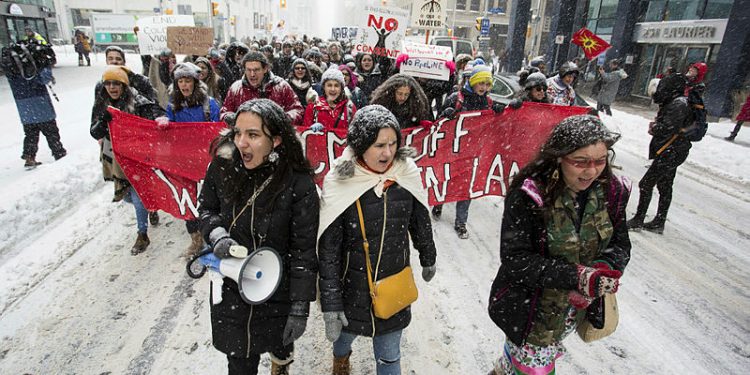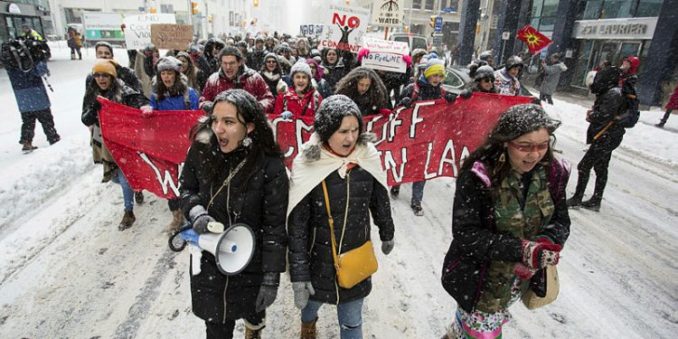

The Wet’suwet’en First Nation faces colonial violence and invasion, as it continues to defend its territory against a multibillion-dollar pipeline project threatening its traditional lands and waters. Wet’suwet’en territorial borders are surrounded by the western province that was named British Columbia by the colonizing nation Canada.


Ottawa protest on Feb. 7 against proposed Coastal GasLink pipeline in northwestern British Columbia.
On Jan. 8, the Unist’ot’en Camp protecting Wet’suwet’en territory called for a week of international solidarity: “On Dec. 31, 2019, B.C. Supreme Court Justice Marguerite Church granted an injunction against members of the Wet’suwet’en nation, who have been stewarding and protecting our traditional territories from the destruction of multiple pipelines, including Coastal GasLink’s (CGL) liquified natural gas (LNG) pipeline. Hereditary Chiefs of all five Wet’suwet’en clans have rejected Church’s decision, which criminalizes Anuk ‘nu’at’en (Wet’suwet’en law), and have issued and enforced an eviction of CGL’s workers from the territory.” (tinyurl.com/sldyrz2)
Church’s injunction is illegal. The Wet’suwet’en hold legal rights to their lands: In 1997, the Supreme Court of Canada recognized Aboriginal title of unceded First Nations lands in the Delgamuukw decision.
But rather than opening relations with the First Nations, whose land has never been ceded, the provincial government of British Columbia and corporate lobbyists are conspiring to force “surrender” of First Nations land rights in order to steal land to construct the $5 billion (6.6 billion Canadian dollars) CGL pipeline. (tinyurl.com/s3b3w4t)
The force used includes the Royal Canadian Mounted Police’s violent raid of sovereign lands in January 2019, which sparked protests across Canada and worldwide.
On Jan. 4, Wet’suwet’en Chiefs escorted out the last CGL contractor. On Feb. 6, the RCMP illegally moved heavy machinery and helicopters onto sovereign, unceded Wet’suwet’en territory and arrested 28 Wet’suwet’en Nation land defenders.
Wet’suwet’en call sparks lightning solidarity
The Jan. 8 solidarity call stated: “Our strength to act today comes from the knowledge that our allies across Canada and around the world will again rise up with us, as they did for Oka, Gustafsen Lake, and Elsipogtog, shutting down rail lines, ports and industrial infrastructure and pressuring elected government officials to abide by UNDRIP (the U.N. Declaration on the Rights of Indigenous Peoples). The state needs to stop violently supporting those members of the 1% who are stealing our resources and condemning our children to a world rendered uninhabitable by climate change.”
On Feb. 5, the Tyendinaga Mohawks blockaded the railroad near Belleville, Ont., at the only eastern link of the Canadian National Railway Co. (CN) between Eastern Canada and Western Canada or the U.S. Midwest. This effectively shut down freight and passenger rail traffic across eastern Ontario. (Progressive Railroading, Feb. 12)
Tyendinaga Mohawks say they will not end their demonstration until the RCMP leave Wet’suwet’en territory.
By Feb. 11, expanding rail protests effectively shut down all routes between Toronto, Ottawa, Montreal and Kingston, and CN warned of a spillover effect on coastal ports. (tinyurl.com/v3aws6w) CN stated dozens of cancelled freight trains had stalled shipment of every category from propane to feedstock for factories. (tinyurl.com/t58tn4c) And CN’s limited railyard space for rolling stock storage added to the shutdown through traffic backup from Halifax, N.S., to Windsor, Ont., and in parts of B.C.
Defiant rail blockades effective
Canadian Manufacturers and Exporters, Canada’s largest trade and industry association, which typically ships goods on some 4,500 rail cars a day, called for increased government intervention. CM&E president Dennis Darby stated his stakeholders — from chemical companies to Dannon Yogurt — have called in alarm over the rail shutdown, vital to Canada’s freight infrastructure. Canadian National moves $250 billion a year over its transcontinental network.
The shutdown also impacts wheat and barley farmers. “Delays will result in farmers being unable to deliver their grain,” Dave Bishop, chair of the Alberta Barley Commission, said. “We are still recovering from the harvest from hell and need reliable grain movement in order to get back on track.” (NPR, Feb. 14)
Corporate media are attempting to foment anti-Indigenous sentiment with warnings of possible propane shortages. (tinyurl.com/rq8sylv)
As of Feb. 12, Via Rail Canada said 157 trains had been cancelled, affecting over 24,500 passengers on the Toronto to Montreal rail corridor. Via Rail service in B.C. province was also shut down by a blockade near New Hazelton, disrupting service on the freight’s northern B.C. mainline. The RCMP arrested 28 people at a Houston, B.C., rail blockage.
Canadian National obtained injunctions to end rail demonstrations near Belleville, Ont., New Hazelton, B.C., and near Winnipeg. Tyendinaga Mohawks defied the provincial court injunctions to open the Belleville blockade.
Ontario Provincial Police were forced into negotiations with the sovereign Mohawks, who have now created a second rail blockade site within Tyendinaga Mohawk territory. And Kahnawake Mohawks have blockaded a Canadian Pacific line near Montreal’s South Shore. APTN News (Aboriginal Peoples Television Network) reports local non-Indigenous allies are bringing supplies to Mohawk blockade sites.
Protests of the ‘history of violence’
As solidarity protests spread, demonstrators disrupted the British Columbia Legislature during Lieutenant Governor Janet Austin’s delivery of the government’s “throne” speech. Protesters camped outside chanted “Shame!” as politicians sought help from hired security to enter the building.
On Feb. 15, 100 protesters physically blockaded a rail line in East Vancouver and handed out flyers that stated: “We want to recognize the shared history of violence experienced by Indigenous people and Punjabi and Chinese communities in so-called B.C.” (tinyurl.com/uyr8pwj)
Wet’suwet’en are raising the B.C. Environmental Assessment Office’s failure to consider the known threat of violence toward Indigenous women, girls and two spirits from fossil fuel project work camps. Canada’s National Inquiry on Missing and Murdered Indigenous Women found “substantial evidence” that resource extraction projects are connected with violent attacks on Indigenous women, children and two-spirit people. CGL plans include construction of 14 such “man camps,” one to house 400 men some 13 kilometers from the Unist’ot’en Healing Centre. (tinyurl.com/tao3qzw)
Unist’ot’en Camp stated on Feb. 10: “Our matriarchs were arrested while holding a ceremony to call on our ancestors and to honor missing and murdered Indigenous women and girls. We, the Unist’ot’en, know that violence on our land and violence on our women are connected. During the ceremony, we hung red dresses to remember the spirits of the murdered women, girls and two spirit people taken from us.”
Andrew Brant from Tyendinaga said the Mohawk are returning the support shown by First Nations in B.C. during the 1990 Oka crisis when Mohawks of Kanesatake, Que., faced the Canadian military over the expansion of a golf course. “We are going to stand with them now,” said Brant. “We’ve gotten driven out of so many places, this is all we have left. We can understand what they are going through.” (tinyurl.com/usuf43x)
How to support the Wet’suwet’en
Solidarity from other First Nations and allies during the unfolding climate crisis has increased support for Indigenous demands for “Land Back.” For how to support the Wet’suwet’en against illegal CGL pipeline construction, go to tinyurl.com/rppq5ke/. To contribute to the Unist’ot’en Legal Fund, go to tinyurl.com/tvg96xj/.
May 19, 2025, will mark the 135th birthday of the great Vietnamese leader Ho Chi…
Philadelphia Honoring the 11 people murdered by the state when they dropped a bomb on…
The centennial of the birth of Malcolm X, also known as El-Hajj Malik El-Shabazz, is…
On May 11, which was Mother’s Day this year in the U.S. and several other…
Philadelphia On Mother’s Day 2025, May 11, Families for Ceasefire Philly and over 20 local…
North Philly Peace Park gathering After a federal court hearing on an anti-immigration bill early…